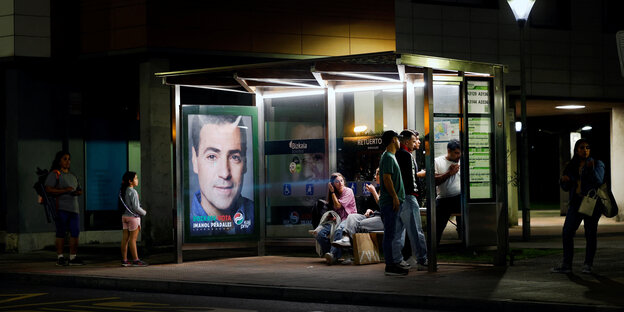An alliance of parties, part of which comes from the separatist organization ETA, could win Sunday's elections.

Public transport electoral poster at a bus stop in the Basque Country Photo: Vincent West/Reuters
MADRID taz | There are signs of change in the Spanish Basque Country. 13 years after the definitive end of the armed actions of the separatist organization ETA and six years after its dissolution, the polls for the elections to the regional Parliament this Sunday place the left-wing nationalist party EH Bildu at the head of the vote for the first time. time.
In addition to the left-wing formations that have always rejected political violence, the EH Bildu party alliance also plays a leading role in the political environment of the dissolved ETA. If the polls are confirmed, the left-wing nationalists would relegate the conservative Basque Nationalist Party (PNV), which has governed the region for 44 years, except for a brief interruption, to second place.
Sunday's elections are elections of new faces. The two main parties, EH Bildu and PNV, are running with young and relatively unknown candidates. Surprisingly, the PNV does not send the lehendakari, head of the Basque Government, Iñigo Urkullu (62), to the race, but the young technocrat Imanol Pradales (48). “Indar Berria, Euskadi Berria” (New Power, New Basque Country) is the motto. Pradales is expected to end the PNV's constant downward trend at the polls after 12 years under Urkullu's government.
It was mainly social problems that led to this: austerity in public services, the partially privatized healthcare system, inflation and rising housing costs. This is the result of surveys carried out by the DeustoBarómetro of the Basque Private University of Deusto.
The word “terrorists” did not leave his lips
EH Bildu addresses these points with its campaign under the slogan “Aldaketa” (change). Its candidate, Pello Otxandiano (41), promises better public services and less privatization. He talks about environmental protection and an economy for the 21st century. The fact that Otxandiano was sent into the race instead of party leader Arnaldo Otegi, as everyone expected, is a surprise. Unlike Otegi, who negotiated the dissolution of ETA, Otxandiano has no history of armed struggle for independence.
However, the press is following him closely on this matter. Otxandiano was asked in a radio interview if he would condemn ETA as a “terrorist band.” He dodged it. ETA is “an armed organization” whose use of violence is “an expression of a past political cycle.” “Fortunately,” ETA no longer exists, so the Basque Country can look forward, he responded. The word “terrorists” just wouldn't come out of his mouth.
That was earlier in the week. Since then, the rest of the candidates have tried to use this against Otxandiano. It is doubtful that this will be successful: in the Deusto Barameter only 0.5 percent mention terrorism as a problem.
Surprisingly, unlike Catalonia, where elections will be held in mid-May, the issue of independence barely influences the electoral campaign. The PNV speaks of a greater expansion of autonomy and EH Bildu promotes a bilateral relationship with Madrid and, therefore, more sovereignty to be able to decide important social and political measures without interference from Madrid.
The socialists rule out an alliance with EH Bildu
However, it seems unlikely that EH Bildu will form a government if it wins the election. Pradales is expected to remain president of the region. To obtain a majority in the Basque parliament, an alliance is necessary at least with the socialists (PSE). And they rule out a merger with EH Bildu in the Basque Country.
After the last local elections, in which EH Bildu became the strongest force, the conservative Popular Party (PP), weak in the Basque Country, intervened to help the PNV and the PSE obtain a majority in several municipalities and in one of the three provincial deputies so that EH Bildu did not govern.
This scenario could now be repeated in the Basque Parliament. It remains to be seen what impact this will have on socialist Pedro Sánchez's minority government in Madrid. He is only in office thanks to the votes of the PNV and EH Bildu.
